A fire station is a unique environment. It is connected to the nervous system of the community it serves. A nervous system that finds every trash fire, car fire, house fire, woman not breathing, child hit my a car, accident with injuries, shooting, stabbing, overdose, difficulty breathing, drowning, cardiac, asthma attack and every other type of personal disaster imaginable. It exists outside the bubble of safety that it helps create for everyone else. When we walk into the station we become part of the nervous system. We become part of all the bad things that happen in our community. We gain knowledge that few outside the station understand exists.
Even if it is not your call, there is this constant litany of emergencies over the radio as other units are dispatched. We stand in the open bay doors and watch children play and ride their bikes in front of the station, while you are listening to units at a shooting on the west side of town. Or you are having breakfast as Engine 6 and Rescue 6 have a woman not breathing. You are cleaning the truck as Engine 2 and Rescue 2 have a stabbing. Then your tones go off and you have your own emergency to manage.
Civilians are the people who live that bubble. That sphere of safety created by us in stations across the city. The bubble where they went to work, ate, slept and played and nobody got hurt or died. Where they felt safe and secure knowing that help is only a phone call away no matter what the emergency. Where they could walk around and not worry about anything except what their own self interest, because when that bubble burst they knew that with a simple phone call we would come and fix whatever was wrong. Our job was to create the bubble and when it burst it was up to us to try to put it back together.
So while we sit in the station in the midst of all of the peace and quite of the neighborhood around us, we are part of this nervous system. We are no longer part of the peaceful world. We are part of the nervous system that can jerk us into the midst of any emergency imaginable. Our job is to create a perceived bubble of safety for our community that protects it no matter what happens. No matter how bad the situation we respond and try and put the pieces back together so people can feel safe again. Can feel protected again. Our job is to try to keep the bubble intact.
When we go to work somebody usually dies, maybe not in fire but in small ways like the auto accident, the drowning, the cardiac, the shooting, the stabbing, or just the end of living a good long life. But somebody died, we live in a world where the unthinkable can and does happen, a world where people die sudden and sometimes ugly deaths. They all had lives and they were over now. Where things are not nice and neat. Where life seems to leave a lot of loose ends. Loose ends that most people only deal with once or twice in a lifetime if they are lucky. These small personal tragedies are our job.
So we enter the real world where actions had terrible consequences. We live with a profound truth that had been lost in our modern society, that death is very near to all of us and it doesn’t take much to cross that line. The great “they” have forgotten it. Modern society seems to try and convince everyone that death is somehow this unusual event. This news-making story of horror. Death is in all our futures in one-way or another. No amount of exercise, diet, drugs or laws will change that ending. Yet in today’s society everyone is so shocked when death does come close.
The nightly news anchors always frown and show concern when they report one of our incidents before moving on to the next story. Secure in the knowledge something so terrible could not happen to them, because they occupy the most protected part of sphere that money, fame and privilege provides. But when it happens to one of them watch their faces. Everything is more real to them. Suddenly it could happen to them and people they know it. But those of us who climb onto the trucks, we have the knowledge. We know how close it is. We think we are smart enough, tough enough and lucky enough to dodge the chances we take on the job long enough to die peacefully in bed.
Because we take that knowledge away from the station, we live with it everyday, it is ground into us. We see life through this new prism. When we walk down the street, go to the beach, go out to eat, we see things that others don’t. We walk in the sphere with the others, but we are always looking for the cracks or leaks that if you are not careful, could make you an accident victim.
We feel separate and apart from those without the knowledge. It is why we spend so many of our off hours with one another. No one else understands. When we tell a story the other guys laugh when they should and shake their heads when they should. It can put up a permanent wall if you let it. This reality pushes you from other people. Friends ask “What happened lately? Do you have any good stories?” But to us, these people are not just stories. They are people who bleed. Who cry. Who die. So you answer “Ah, nothing much happened.” Because when we tell a story if it is for the vicarious thrill of somebody, it diminishes the pain of the victim and our efforts.
What we did is not a story. What we did was a desperate attempt to beat back the inevitable in many cases. But it is our job to try. Certain events stuck in our mind the way signposts draw you attention on the Interstate. They are turning points. Point of reference. Many times they are turning points in our own lives. What we did. What we saw. What we heard. What we tried to do. How we tried to help sometimes can fundamentally change who we are, and how we view the world. And yet none of these events make the headlines. They are the little articles on page two in the local section of the paper, but we carry it around with us each day for the rest of our lives. It separates us from those around us who don't have the knowledge who don't understand. It is the reason that even after thirty years when I see someone I served with we shake hands, smile and ask how they are doing, but there is always a moment that we exchange a glance, a recognition of someone else who knows, who understands, who has the knowledge. The knowing makes us part of a brotherhood. A brotherhood that separates us from those around us and places us the outside the bubble we created.
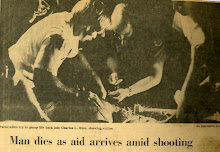

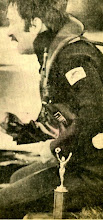
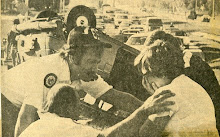
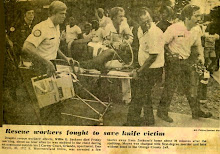
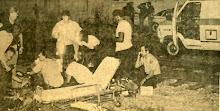

2 comments:
Such a brilliantly written post, I think you have put my exact feelings into words. Something I could not have done anywhere near as well as you just have. Glad you're writing again, I did enjoy reading your old stuff.
Hope you don't mind if I link this on my blog.
Thanks so much. It nice to hear that our experiences are so similar even overseas. I have always thought that the Street is still the Street no matter where you are. I have returned the favor and added your blog to my links. For some reason it leaves off the E in A&E I am still working on it.
Post a Comment